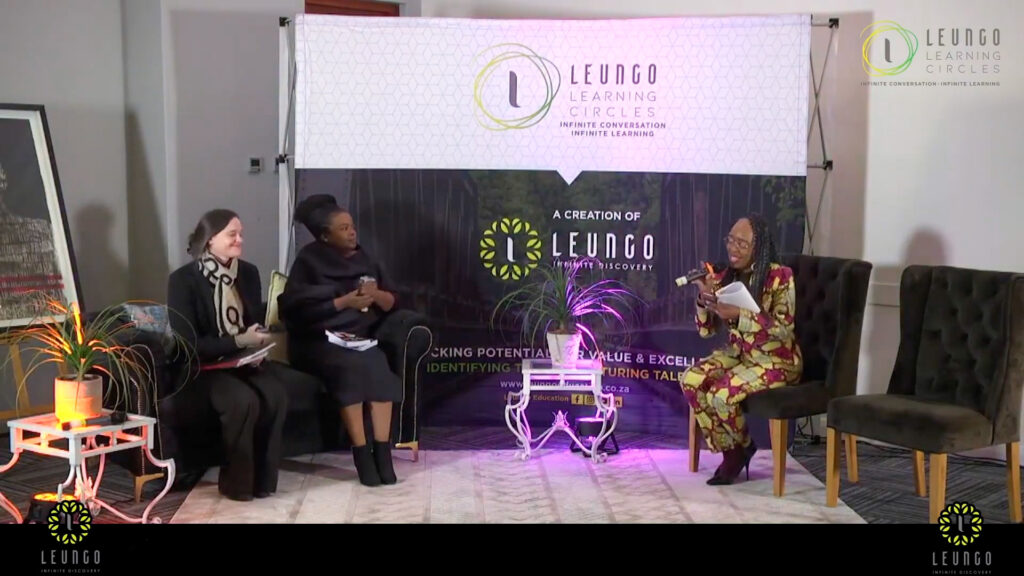Ido Lekota sat down with founder and CEO of Leungo Education, Thami Mangele, to find out more about the important work she is doing in empowering Africa’s future leaders
Her grandfather, Professor William Kgware—the then rector of the University of the North—was the first black university vice-chancellor in South Africa. Her grandmother, Winfred Kgware, was a teacher and the first woman president of a political party (Black People’s Convention) in South Africa. Her mother, Manana Kgware, was a student activist of the 1970s, as well as a lecturer at both the then University of the North and the University of Fort Hare.
With such political and academic pedigree, Thami Mangele has not disappointed; picking up the baton operating as an IT consultant cum social entrepreneur. She is the founder and CEO of Leungo Education—a change management, skills training, capability and capacity development, and work experience training consultancy.
As a consultancy, Leungo boasts corporate experience in over 13 industries in both public and private sectors, including Audit and Advisory, Energy, Aviation, IT, Education and Training, Oil and Gas, Manufacturing, Retail, and Engineering.
“We are about being the preferred excellence partner in developing relevant skills, personal mastery, and creating capacity for industries through New Age Research and Development. We are all about developing communities of interest, and a global competitive mindset,” explains Magele.
“Our name, Leungo, is a Tswana word which means ‘fruit’ in English. We believe we are all seeds waiting to be nurtured into full-grown fruit. This is because we believe we are all equally talented with specific purposes in life.”
One of the skills development projects Leungo has been running over the past year has to do with training unemployed graduates and matriculants in systems development and business analysis skills, funded by the Media Information Communication and Technology (MICT) SETA. It was during the training that Leungo identified skills gaps that need to be addressed. To do so, Leungo adopted a learner-centred approach, focusing on peer learning, critical thinking, and problem-solving, thereby enhancing the trainees’ employment readiness.
Another invention by Leungo is a Peer Network Solution App which enables collaboration and knowledge sharing among its users across the African continent.
“The core beneficiaries of the App are high school learners, the unemployed youth, and anyone seeking to learn continuously—including professionals learning from each other through the established communities of interests and practice networks,” posits Magele.
She is also the founder of Leungu Learning Circles, a non-profit organisation “committed to empowering and restoring the dignity of the African child, so that Africa leads in excellence”.

Leungo Learning Circles is essentially a platform where African professionals from all walks of life, with their variius experiences, come together to have relevant and relatable conversations affecting Africa’s development and the future of its children.
Practically, Leungo Learning Circles is geared towards developing an action plan for the implementation of whatever solutions the participants come up with, aimed at improving the opportunities for Africa’s children to become masters of their future. To this end, Leungo Learning Circles’ focus is on educating Africa’s children to become critical contributors to an Africa with a sustainable future.
“Leungo Learning Circles is about changing the narrative of the future of Africa’s children; instilling a winning mindset; challenging all to think critically about the issues facing Africa; and considering what role we can all play in contributing to positive change and finding solutions to move forward.
“Africa is home to some of the world’s fastest-growing economies with a young dynamic population. By focusing on the ‘How do we move Africa forward’ conversation, we are acknowledging the existence of fundamental sustainable developmental gaps and perpetual patterns broadening the divide between opportunity and success.
“The interest to move Africa forward is a quest to unpack and understand existing old and new applicable successful practices, highlighting our diversity as a strength for creating and seizing new opportunities as a collective; so we can create an environment to empower the future fit African child,” avers Magele.
Some of the topical issues tackled by Leungo Learning Circles as a way of moving Africa forward include:
- Africa’s fitness for growth: By 2030, 18 million new formal jobs will be needed annually. Currently only three million are created to absorb new labour market entrants.
- Learning Systems and Environments: Future fit Africa. Currently more than 60% of Africa’s population is below the age of 25. By 2030 they could constitute 42% of the global youth.
- Introduction of the STEAM (Science, Technology, Engineering, the Arts, and Maths) education approach: STEAM education is an approach to learning that uses Science, Technology, Engineering, the Arts, and Mathematics as access points for guiding student inquiry, dialogue, and critical thinking. In 2018, South Africa’s cultural goods market was valued at $446.5 million (R8.7 billion). How can art empower the Africa Child and Africa?
- Health: Establishing youth advisory teams. Africa is the fastest growing continent with severe health personnel shortage. How can we create both healthy societies and a workforce?
- Agriculture: Food security and farming for health. Agriculture will remain one of the main sources of youth employment. So how do we make the sector more appealing?
- A seat at the Table: Empowered participation and decision-making. Does Africa’s youth understand their role? What is Africa’s leadership strategy to reconnect its largest constituency?
To redress the latter mentioned situation, Leungo Learning Circles is committed to deliberately targeting young leaders as participants in the Leungo Learning Circles’ engagement sessions, “because as elders we cannot think that we can come up with solutions to the challenges they are facing without their input”.
“As the driver of Leungo Learning Circles, Leungo Education most definitely believes in the principle of nothing about us without us,” states Magele.
A major step in this regard is Leungo Education’s recently signed agreement with Maphutha Secondary School in Thembisa, whereby volunteers from Leungo Learning Circles will be running a youth empowerment programme targeting Grades 8 to 12 learners. The project is called, the SEED programme.
“This is the SEED (Peu in Tswana) from which will grow the fruit (Leungo in Tswana) that can hopefully help nourish a generation of future-fit African youth which will take its rightful place in the global economy,” explains Magele.
“The SEED programme is part of our commitment to providing quality education to underserved communities throughout the African continent. We know that such kind of support we offer to the learners does contribute to the learners’ academic performance achievements and success, and is associated with improved grades, strong attendance, and positive relationships between students, teachers, and adults, as well as minimal engagement in risky behaviour. This is indeed a holistic intervention in the situation that our youth in underserved communities find themselves.”
The programme—which includes input from professionals from various sectors—helps the learners to develop a positive mindset and self-awareness. The learners will also be guided on developing critical skills, including creativity and innovation, critical thinking and problem-solving, communication, and presentation skills.

The programme is also about closing the gap between school and work readiness by helping them develop interviewing skills, CV writing, business communication and writing skills, career guidance, and research skills.
Most importantly, the programme does not target only the learners but also the teachers who must be empowered to guide the soon-to-be-empowered learners. This includes moving from the “big sage” approach of teaching to a more learner-centred one.
The project therefore also includes empowering teachers by helping them develop critical thinking-driven content for learners.
This is an approach which, according to research, promotes effective learning and produces quality learning outcomes for the learners. It is the kind of teaching and learning that actively involve learners in their own learning and personal development.
The programme also involves parents, because research has once again shown that parents playing an active role in their child’s learning does contribute to the quality of learning. Such research has also shown that the lack of parental support and a lack of high-quality instruction lead to poor educational outcomes.
To this end, the programme includes running workshops for both teachers and parents in preparation for the new role they now have to play in support of their soon-to-be-empowered learners and children.
A buoyant Maphutha Secondary School principal, Andile Tshabalala, says the SEED programme is an important step towards building the much-needed high self-esteem among both the learners and the teachers.
He says that confronted by the current situation where there is truancy and disengagement from the learners. Many teachers found themselves at sea when it comes to encouraging learner participation in class. This has led to many teachers becoming disheartened and just going through the motions.
“I am hoping that through the programme our teachers will be well-armed to face the challenges of teaching a now more assertive cadre of learners and not become overwhelmed,” Tshabalala says.
“Self-awareness is an important ingredient in young people’s education because it provides students insight into who they are, and why they react as they do, as well as giving them direction for self-improvement. This is because self-aware people have a fundamental belief in the ability to achieve whatever goal in their lives.”
Ido Lekota is a media practitioner and an independent socio-political commentator.

